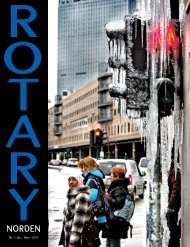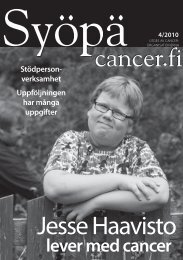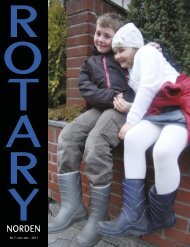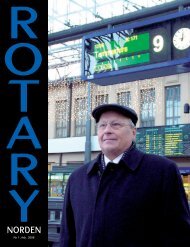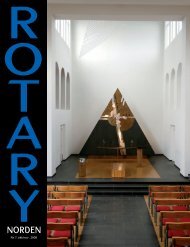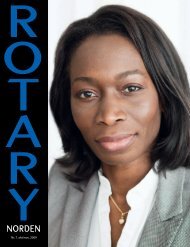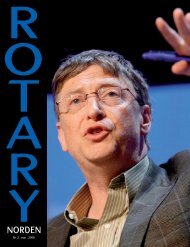Create successful ePaper yourself
Turn your PDF publications into a flip-book with our unique Google optimized e-Paper software.
have benefited from the CLE method over the past four<br />
years through CLE projects, according to Kotb Soliman,<br />
a past Zone 10 literacy coordinator.<br />
In the New Cairo effort, 15 to 20 women enroll in<br />
each class, with a total of 240 people ages 16 to 45 expected<br />
to participate during the 1 ½ years of the project,<br />
which started in January 2008. The women come from<br />
poor families who were relocated to New Cairo after the<br />
1992 earthquake in Giza Governorate.<br />
Aside from literacy skills, the students learn about<br />
reproductive health in the classes. “The same person<br />
should have knowledge in both,” says Ahmend Sami<br />
Saad, a member of the New Cairo club. Doctors and<br />
other health care specialists provide education on child<br />
spacing and other women’s health topics, with the goal<br />
of reducing the mortality rate for mothers and infants.<br />
Surveys in developing countries have found that<br />
even small amounts of education for women – one to<br />
three years – can decrease child mortality. A study in<br />
Bangladesh found that the child of a woman with primary<br />
education is<br />
about 20 percent<br />
more likely to survive<br />
than a child of<br />
a woman with no<br />
education, according<br />
to UNESCO’s<br />
State of the World’s<br />
Children 2008.<br />
For the vocation-<br />
A Rotary-sponsored CLE program al training aspect of<br />
in Turkey focuses on teaching adult<br />
the project, students<br />
women basic literacy skills.<br />
receive four months<br />
of sewing instruction. The club provides the materials<br />
and recruits trained professionals from within the<br />
community, and the students receive the proceeds from<br />
product sales.<br />
Spreading literacy in South Africa<br />
Victor Bredenkamp learned what it’s like to be illiterate<br />
while he was in China as a visiting professor.<br />
“If you can’t read street signs and newspapers, it’s almost<br />
a form of blindness. It was to me in China,” says<br />
Bredenkamp, past governor of District 9270 (South Africa)<br />
and a member of the Rotary Club of Pietermaritzburg.<br />
The experience made him realize how difficult life is<br />
for illiterate people in his home province of KwaZulu-<br />
Natal. When he retired as dean of the University of<br />
Natal, Bredenkamp launched an adult literacy project<br />
through his club. Since its inception in 1993, the effort<br />
has reached 13,000 people.<br />
Global Resources<br />
The following RI resources can help Rotary clubs create<br />
a successful literacy project.<br />
To order RVM, visit shop.rotary.org. To find the literacy<br />
resource group or tool kit, search www.rotary.org.<br />
RVM 3.2<br />
Working under a Health, Hunger<br />
and Humanity Grant from The Rotary<br />
Foundation, Rotarians in Brazil,<br />
Canada, and the United States<br />
set up a center to teach the concentrated<br />
language encounter literacy<br />
method in Contagem, Brazil. More<br />
than 1,900 teachers and educa-<br />
tion experts have learned the CLE<br />
technique, which has been used to<br />
teach over 72,600 benefi ciaries nationwide how to read<br />
and write. In volume 3, issue 2, of RVM: The Rotarian Video<br />
Magazine, watch how the program is giving students in<br />
a crime-ridden area a chance for a better future. The<br />
DVD is available in English with voice-overs in French,<br />
Japanese, Korean, Portuguese, and Spanish. English<br />
subtitles are included for the hearing impaired. 506-07;<br />
US$15<br />
Literacy Resource Group<br />
The Literacy Resource Group con-<br />
nects Rotarians with the tools<br />
they need to promote literacy at<br />
home and abroad. Coordinators’<br />
contact information and resources for developing club<br />
and district projects are available at www.rotary.org.<br />
The RI Web site also features the ProjectLINK database,<br />
a tool for fi nding model literacy projects as well as<br />
those in need of support worldwide. Other materials<br />
available online include A Menu of Service Opportunities,<br />
Community Assessment Tools, and a computer-based literacy<br />
program fact sheet. www.rotary.org<br />
Every School a Star: A Literacy Tool Kit<br />
Developed by Rotary International<br />
and the International Reading Association,<br />
this downloadable kit<br />
is designed to help Rotary clubs<br />
and reading councils select and<br />
implement projects that meet the<br />
literacy needs of schools in their<br />
communities and around the<br />
world. Find examples of successful<br />
efforts along with contact information, resources,<br />
and service opportunities. Use tools including questionnaires<br />
and a teachers’ wish list to help determine<br />
the right project for your area. Available in English only.<br />
www.rotary.org<br />
GLOBAL OUTLOOK



